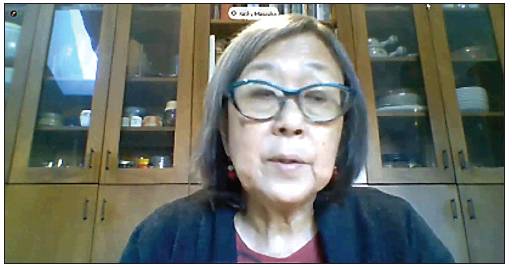‘Long Overdue’: Masaoka Testimony in Support of HR 40
The following is the testimony as presented by Kathy Masaoka on behalf of NCRR and NP before the Judiciary Subcommittee on the Constitution, Civil Rights and Civil Liberties on Feb. 17, 2021. The written testimony is available on request. See the full hearing at https://judiciary. house.gov/calendar/eventsingle. aspx?EventID=4367).
Good morning, Chairperson, ranking member of the committee and members of the committee.
The Nikkei for Civil Rights & Redress (NCRR) and Nikkei Progressives supports H.R. 40 and the Black community’s demand for reparations because: 1) it is the right thing to do; 2) it is long overdue and 3) because we know it is possible — we won reparations in 1988. But JapaneseAmericans were not the first to make the demand.
The Black community has long demanded reparations. Even before the Civil War and since emancipation, individual Black Americans fought for and won limited reparations. In 1963 Queen Mother Audley Moore, the mother of the modern-day reparations movement, launched a campaign, claiming back pay for descendants of enslaved peoples as well as job quotas and training. Groups like the Self Determination Committee formed in 1956 along with the National Coalition of Blacks for Reparations in America, the National African American Reparations Committee and others have called for reparations for the institution and legacy of slavery.
And H.R. 40 has a long history since it was introduced into Congress over 30 years ago by the late Congressperson John Conyers.
Our community’s demand for reparations did not arise by itself, but was inspired by the Black community’s fight for civil and equal rights in housing, education, and more. Their sacrifices and leadership opened the doors for us and gave us the strength to demand redress and reparations from the U.S. government.
We have to acknowledge the generous support of many Black groups and individuals who supported us in our campaign for redress and reparations — like Congressman Mervyn Dymally, who authored a Japanese American redress bill in 1982; Rep. Ron Dellums, who spoke in support of the bill; and the Black Congressional Caucus, and many others, including then California Assemblywoman Maxine Waters and Rev. Jesse Jackson.
H.R. 40 is an Important First Step
H.R. 40 is an important first step towards reparations for the Black community.
In 1981, when the Commission on Wartime Relocation and Internment of Civilians (CWRIC), a commission “to study if a wrong had been committed,” was first proposed, many of us, including me, were against it — angry that the injustice of the concentration camps was even a question!
But we soon understood that this was an opportunity for many former incarcerees to speak out about the feelings and experiences they had held inside for 40 years, so the community swung into action to mobilize testifiers for the hearings. NCRR played a key role in organizing grassroots support within the Japanese American community, insisting that former incarcerees speak at the hearings instead of having just “experts” or “academics” testify.
Many of the Sansei (third-generation Japanese Americans and children of the incarcerees) organized this effort. We heard anger, sadness, pain and strength as we listened to stories we had never heard before — none of us could stop listening. It was an opportunity to begin the healing process for our elders, for ourselves and for the entire community.
More importantly, it was a chance for those incarcerated to express their own demands — for income and freedoms lost, for babies who died, for dignity taken away and much more. The hearings brought Issei, Nisei and Sansei (first, second, and third generations) together to build a grassroots campaign, educate others about the incarceration, and reach out to other communities to win reparations.
Moreover, the hearings solidified our determination to hold our government accountable and to continue the campaign no matter how long it took.
Similarly, H.R. 40 is an opportunity for all of us to learn about institution and legacy of slavery and its destructive impact on the Black community. This is a chance for many Black voices to be heard and for the Black community to express what kind of reparations it is owed.
This is an opportunity for all of us to listen and learn their stories, from broader historical contexts to the most personal testimonies of pain, trauma and generational struggle. Just as it was important for Japanese Americans to determine our path towards redress and reparations, we fully stand behind the Black community as they determine their own path forward.
There is no dispute that the wealth of this country was built on the stolen lands of Indigenous people and on the free slave labor of Black people. In other words, reparations are owed to Black people and to the Indigenous people, as guided by their communities.
The Movement for Black Lives ToolKit talks about reparations being owed, in a manner and form to be determined by the Black people. It must take as many forms as necessary to equitably address the many forms of injury caused by the institution and legacy of slavery.
H.R. 40 is a necessary first step towards justice. It is a first step towards healing.
In Unity, Nikkei for Civil Rights & Redress Coordinating Committee: Richard Katsuda, co-chair; Janice Iwanaga Yen, Secretary; Kathy Masaoka, co-chair; Suzy Katsuda, Treasurer; Kay Ochi, co-chair Nikkei Progressives Coordinating Committee: June Hibino, cochair; Alex Kanegawa, co-chair; Jan Tokumaru, co-chair; Mark Masaoka, co-chair; Joy Yamaguchi, Co chair; Alan Kondo, Mia Barnett, Carrie Morita, Kristin Fukushima, Kathy Masaoka, traci kato-kiriyama, Mike Murase, Kimi Maru, Miyako Noguchi, Sean Miura, Tony Osumi
